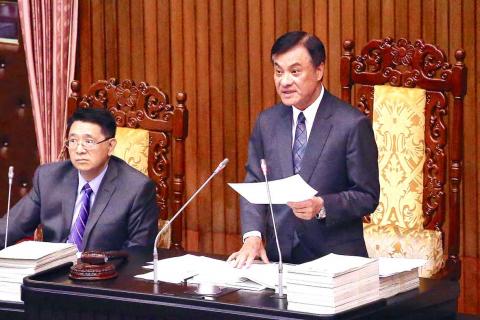The Legislative Yuan yesterday issued a joint statement on the South China Sea ruling, rejecting “any arbitrary decision made by international arbitration” concerning the Republic of China’s (ROC) rights over “the South China Sea islands and their relevant waters.”
Amid inter-party struggles in the legislature over the bill dealing with ill-gotten party assets, the four party caucuses reached consensus over the nation’s stance toward the ruling on Tuesday by the International Court of Arbitration in The Hague.
A statement announced by Legislative Speaker Su Jia-chyuan (蘇嘉全) at 5pm yesterday said that the arbitration ruling has “seriously damaged the rights of the nation to its territory and the regional peace of the South China Sea.”

Photo: CNA
“The legislature, the ROC’s highest representative institution and authorized by the nation’s citizens, has made a resolution to make an international statement on the basis of facts and jurisprudence,” it said.
“The ROC enjoys the rights conferred by international law over its South China Sea islands and its relevant waters as they are, in terms of history, geography and international law, part of the ROC’s territory and waters. Any country’s claims or occupation or any international arbitration’s arbitrary decision will not be recognized by the ROC,” the statement said.
“The ROC has been substantively occupying and effectively governing Taiping Island [太平島, Itu Aba Island] of the South China Sea islands for more than half a century without interruption. Former presidents Chen Shui-bian (陳水扁) and Ma Ying-jeou (馬英九) both visited the island, which has infrastructure for daily living and administration and military construction, in 2008 and this year respectively and confirmed the nation’s occupation and sovereignty, which is not to be challenged by any country or arbitration,” it said.
The third point of the statement said that the ROC government has undertaken and will continue to undertake “both outward-facing and inward-facing sovereignty protecting actions regarding the South China Sea islands including Taiping.”
The “outward-facing” part will be continuing its campaign to show the international community and related organizations evidence affirming the nation’s rights and claims over the islands and their relevant waters; the “inward-facing” action will be continuing the building on Itu Aba, including bolstering the forces and military equipment stationed there, promoting academic research and tourism, and reinforcing the basic infrastructures for transportation, communications and environmental protection.
“Taiping Island is a natural island, not a rock. The arbitration tribunal’s judgement is obviously at odds with facts. And that the award refers to the nation as ‘Taiwan Authority of China’ has belittled the nation’s status as a sovereign nation and is unacceptable to the ROC government and its people,” the statement said.
The resolution to make the statement, the cross-caucus negotiation for which was initiated by the People First Party (PFP) caucus, was endorsed by all caucuses, the Democratic Progressive Party, the Chinese Nationalist Party (KMT), the New Power Party and the PFP.
There was no mention of the “U-shaped line” or the “11-dash line” claims in the statement.

AGING: As of last month, people aged 65 or older accounted for 20.06 percent of the total population and the number of couples who got married fell by 18,685 from 2024 Taiwan has surpassed South Korea as the country least willing to have children, with an annual crude birthrate of 4.62 per 1,000 people, Ministry of the Interior data showed yesterday. The nation was previously ranked the second-lowest country in terms of total fertility rate, or the average number of children a woman has in her lifetime. However, South Korea’s fertility rate began to recover from 2023, with total fertility rate rising from 0.72 and estimated to reach 0.82 to 0.85 by last year, and the crude birthrate projected at 6.7 per 1,000 people. Japan’s crude birthrate was projected to fall below six,

Conflict with Taiwan could leave China with “massive economic disruption, catastrophic military losses, significant social unrest, and devastating sanctions,” a US think tank said in a report released on Monday. The German Marshall Fund released a report titled If China Attacks Taiwan: The Consequences for China of “Minor Conflict” and “Major War” Scenarios. The report details the “massive” economic, military, social and international costs to China in the event of a minor conflict or major war with Taiwan, estimating that the Chinese People’s Liberation Army (PLA) could sustain losses of more than half of its active-duty ground forces, including 100,000 troops. Understanding Chinese

US President Donald Trump in an interview with the New York Times published on Thursday said that “it’s up to” Chinese President Xi Jinping (習近平) what China does on Taiwan, but that he would be “very unhappy” with a change in the “status quo.” “He [Xi] considers it to be a part of China, and that’s up to him what he’s going to be doing, but I’ve expressed to him that I would be very unhappy if he did that, and I don’t think he’ll do that. I hope he doesn’t do that,” Trump said. Trump made the comments in the context

SELF-DEFENSE: Tokyo has accelerated its spending goal and its defense minister said the nation needs to discuss whether it should develop nuclear-powered submarines China is ramping up objections to what it sees as Japan’s desire to acquire nuclear weapons, despite Tokyo’s longstanding renunciation of such arms, deepening another fissure in the two neighbors’ increasingly tense ties. In what appears to be a concerted effort, China’s foreign and defense ministries issued statements on Thursday condemning alleged remilitarism efforts by Tokyo. The remarks came as two of the country’s top think tanks jointly issued a 29-page report framing actions by “right-wing forces” in Japan as posing a “serious threat” to world peace. While that report did not define “right-wing forces,” the Chinese Ministry of Foreign Affairs was